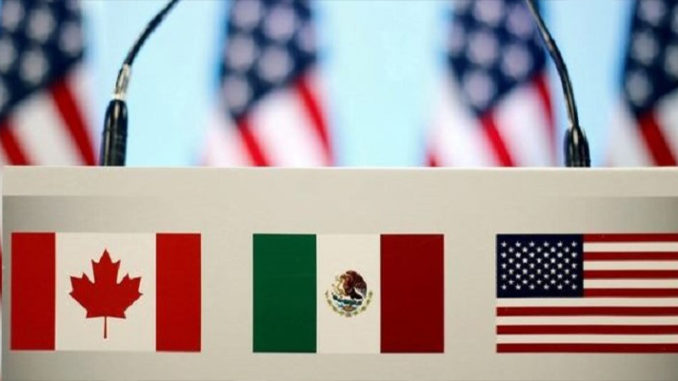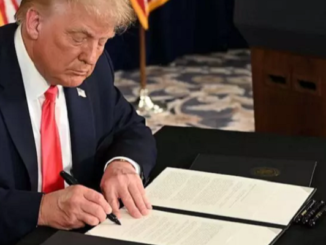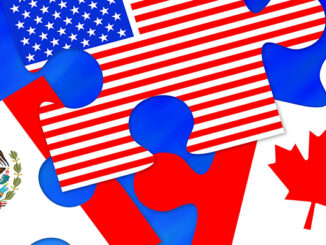
by Erica Werner, David J. Lynch and David J. Lynch, Washington Post
President Trump’s effort to rework a major trade deal with Canada and Mexico is showing signs of faltering on Capitol Hill, straining under a variety of angry complaints from lawmakers of both parties who won’t commit to backing the plan.
Trump reached agreement with Canada and Mexico last year to update the 1994 North American Free Trade Agreement. But Congress must approve the deal, and the White House has been unable to mollify the growing complaints.
The administration’s goal is to get the pact approved ahead of Congress’s annual August recess. It’s not clear if that timeline is realistic. But delaying action past Labor Day could greatly increase political risk because of the accelerating presidential campaign.
In the latest obstacle, key Republican senators including Finance Committee Chairman Charles E. Grassley (R-Iowa) have begun insisting stridently that Trump lift steel and aluminum tariffs imposed on Canada and Mexico as a precondition to any congressional vote.
Grassley said in an interview Thursday that he’d made the case directly to Trump at a recent meeting, but that the president refused to budge. Nonetheless, Grassley predicted Trump would have no choice but to give in if he wants the new NAFTA deal — one of the signature promises of his presidential campaign — to advance.
“The tariffs are going to come off because the president has a good agreement,” Grassley said. “It’s just a matter of his realizing that nothing’s going to happen until the tariffs go off. And so the tariffs come off if he wants to get a win.”
Trump’s top advisers, including U.S. Trade Representative Robert E. Lighthizer, are refusing to cancel the tariffs until Canada and Mexico accept quotas on their metals exports. The tariffs were imposed last year in response to a flood of Chinese steel that depressed global prices and dented the fortunes of American steelmakers. The administration now wants quotas as a fallback defense against shipments from China making their way to the U.S. market via Canada or Mexico.
But for Canada, too, the tariffs are the biggest sticking point to consideration of a deal. Prime Minister Justin Trudeau’s government, weakened by domestic political controversy, faces voters in October. Canada’s House of Commons has an ever-narrowing window to ratify the deal on their end, and it could be near impossible if the tariffs remain.
“The existence of these tariffs for many Canadians raises some serious questions about NAFTA ratification,” Chrystia Freeland, Canada’s foreign minister, told reporters after a meeting with Lighthizer this week.
“I don’t want to sound threatening, because that is not helpful, but practically speaking, we have an election coming up in Canada. It will be extraordinarily tough if steel and a aluminum tariffs are in place,” said David MacNaughton, Canada’s ambassador to the United States.
The revised trade deal, which Trump calls the USMCA, would require more automobile components to be assembled in North America in order to avoid import penalties, impose higher wage provisions, open up Canada’s dairy sector, and include stricter rules for intellectual property and Internet commerce.
Support from House Democrats would be crucial for the new trade deal to advance, but they have raised a host of issues. Some liberals have insisted the deal is a nonstarter because of a provision related to prescription drugs — an uncompromising stance that has irked a group of their fellow Democrats who are more oriented toward free trade.
House Speaker Nancy Pelosi (D-Calif.) can single-handedly determine the pact’s fate by deciding whether to put it on the floor. But she said Thursday that she needs to see stronger enforcement provisions in the deal before agreeing to embrace it.
“We need to see enforcement. I’ve said it all along. It’s no mystery,” Pelosi told reporters at the Capitol. “You can say all the nice things you want in the world and write them up, but unless you have enforcement you’re just going down a path that isn’t going to be helpful to America’s workers.”
Pelosi is referring to a common complaint from Democrats and labor groups, which is that they want to know what specific penalties Mexico and Canada might face if they flout the rules.
Underlying all the maneuvering are the complicated politics of trade, which have long divided Democrats and have grown only more complex in the Trump era. The president has forced his protectionist impulses onto a Republican Party that traditionally supported free trade. With a presidential campaign looming and numerous Democrats vying for their party’s nomination — including some who’ve already denounced the deal — passage will only get tougher as time goes by. But lawmakers on both sides say much work remains to be done for the agreement to stand a chance on Capitol Hill.
“It’s going to be a tough fight, but it’s certainly one that’s workable and doable,” said Phil Cox, a veteran of numerous Republican political campaigns, who is helping lead a business-funded campaign to marshal support for the deal.
All the unresolved issues has left the entire process up in the air. White House officials have said they will work with lawmakers to try to address concerns, but they rule out reopening the trade deal to satisfy Democrats’ demands for tougher labor, environmental and enforcement provisions, because identical versions must be approved by Mexico and Canada.
If U.S. lawmakers don’t eventually pass the deal, Trump has threatened to try to terminate the existing NAFTA, a prospect that has mortified lawmakers from both parties and the business community.
“I don’t think trying to jam Congress is a good idea,” said Sen. John Cornyn (R-Tex.), who warned that the deal doesn’t command the votes to pass, partly because of the tariff issue. Passing “fast track” trade rules was a struggle during the Obama administration, Cornyn recalled, and said, “My impression is that trade’s taken a little bit of a battering since that time, in both political parties.”
But Trump administration officials are in the middle of several trade-related fights elsewhere, and it’s unclear how much bandwidth they have been willing to devote to the Canada and Mexico deal. They are in tense discussions with Chinese leaders that have already missed several deadlines. Talks with European Union leaders, meanwhile, appear to have flatlined in an dispute over agricultural imports.
Trump already declared victory on the Mexico and Canada talks last year, when he notched a tentative agreement with leaders from both countries, but the deal is not complete until it is ratified by Congress.
In the House, liberals have coalesced against provisions codifying exclusive rights to a class of drugs known as biologics for 10 years, something they say makes the entire deal a nonstarter.
“The bottom line is it’s a total giveaway to Big Pharma,” said Rep. Ro Khanna (D-Calif.).
At the same time, administration efforts to woo organized labor thus far have fallen short. The AFL-CIO said earlier this month it would not back the agreement unless the Mexican parliament first approves promised labor reforms to comply with its USMCA promises.
“There’s a lane, but everything has to fall just right,” said Dan Ujczo, an attorney with Dickinson Wright who follows trade issues closely and recently met with White House officials. “The relationship between the White House and Congress would have to work perfectly and there’s no objective evidence that can happen.”
No one has given up on the agreement, however. Little overt opposition has hardened, according to William Reinsch, a former Commerce Department official now at the Center for Strategic and International Studies.
“Trump is his own worst enemy here. If he would just shut up and let Lighthizer manage it, it would get through,” Reinsch said.
In 2018, the White House imposed a 25 percent tariff on steel imports and a 10 percent tariff on aluminum imports from a range of countries, including Canada, Mexico, Japan and members of the European Union. Trump justified the unilateral move by saying steel and aluminum imports threatened the national security of the United States. This allowed him to bypass Congress, but now lawmakers have much more sway.
The United States does import a large amount of steel and aluminum, and the United States and other countries for years have complained that China has flooded the world with cheap metal in such a way that it destroyed domestic producers. But U.S. companies do not directly import much steel and aluminum from China, so it was difficult for Trump to target Beijing with the move. Instead, the higher costs largely hit U.S. allies that Trump was trying to crack down on anyway, particularly as he was hoping to create leverage to tighten trade rules with Canada and Mexico last year.
Trump has said the imposition of tariffs has helped revive the U.S. steel and aluminum industries, and it has proved to be very popular with a number of chief executives. But the tariffs have drawn fury from manufacturers and other companies that have complained they have to pay higher prices to import products and that they are passing those costs along to U.S. consumers.
In September, the United States, Canada and Mexico agreed to overhaul the 24-year-old North American Free Trade Deal. Trump and several Cabinet officers had suggested they would lift the tariffs once a deal was signed, but opted at the last minute to retain them as leverage in their drive for quotas.
Sen. Patrick J. Toomey (R-Pa.) acknowledged that imposition of the tariffs helped convince Canada and Mexico to negotiate seriously over a new North American trade deal. But he criticized the resulting USMCA as “not a good outcome,” saying that its 16-year sunset clause and restrictions on the process for resolving disputes would result in less trade.
There is still time to iron out these concerns. Congress won’t act on legislation to implement USMCA until lawmakers receive the International Trade Commission’s analysis of the deal’s economic impact, which is expected by April 19. Once that happens, they will have several months to reach a decision.
“They’ve got some serious hurdles, and the clock is not their friend,” Toomey said.
Damian Paletta contributed to this report.



